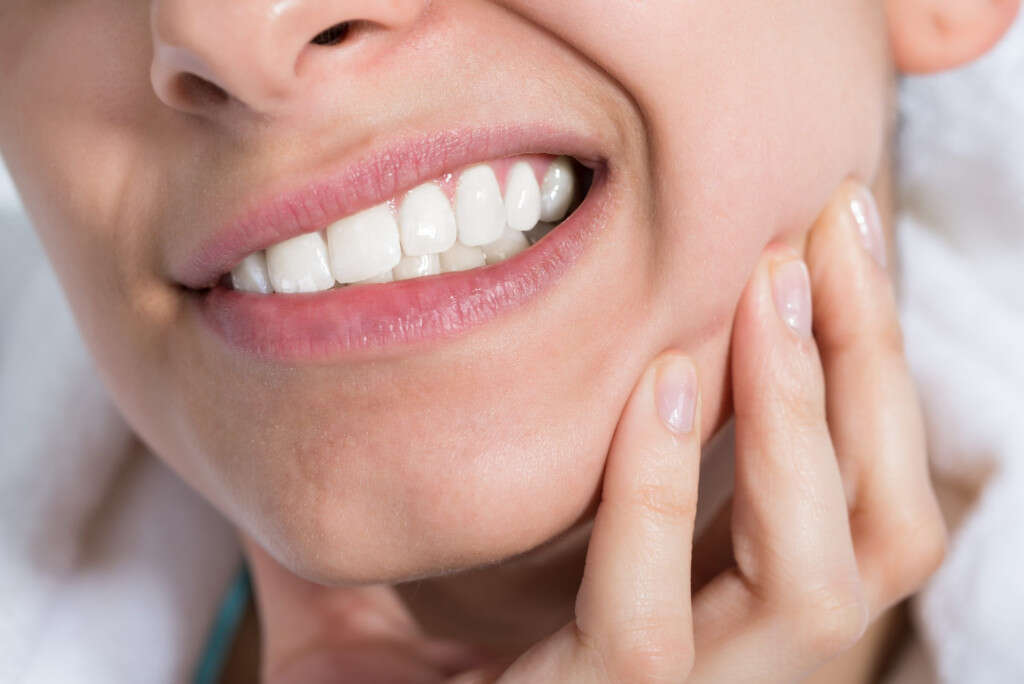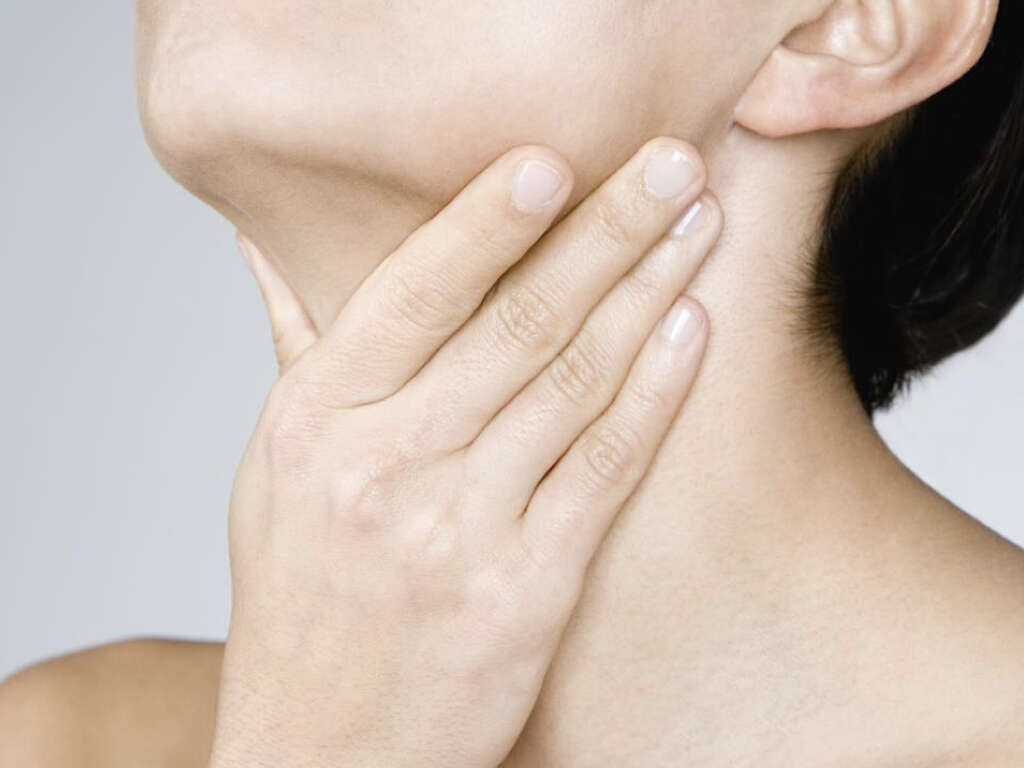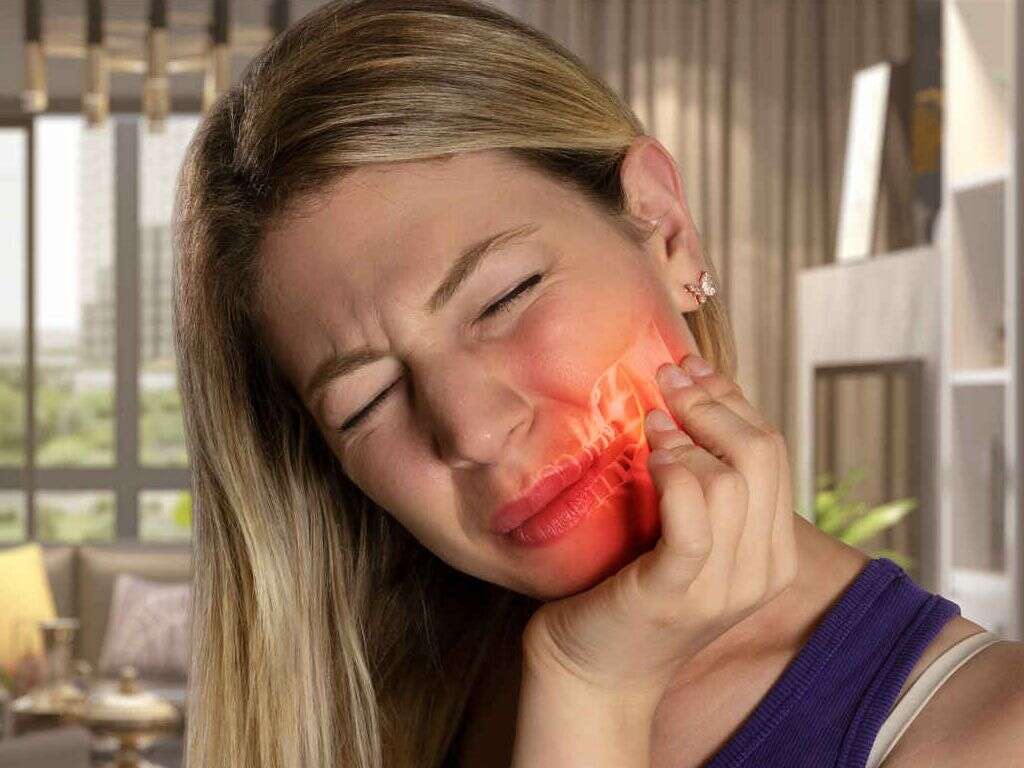10 Symptoms of TMJ
Our jaws are flexible enough to be used in a number of ways. One of the most obvious is in eating, but the flexibility also helps with speech. Our jaws have evolved to be used often and they will usually work just fine without any complications throughout our lives. However, things can sometimes go wrong and this can be quite difficult to live with.
Our jaw bones are connected to the skull at the temporomandibular joint. Temporomandibular joint disorder, also known as TMJ disorder, is a condition that is responsible for various malfunctions of this joint and the surrounding area 1https://www.mayoclinic.org/diseases-conditions/tmj/symptoms-causes/syc-20350941. The condition has a number of causes, and there are medicines and remedies which can be effective in treating the condition. In severe cases, surgery may be necessary.

Symptom #1: Jaw Pain
Our jaw muscles are in action quite a lot throughout the day, even if we don’t really think about it. Our jaw is moving when we speak and is also needed when eating, especially when chewing on something that’s a bit tough. Heavy chewing in particular can lead to some aching in normal joints, but it can be particularly painful in people that have the disorder.
People with TMJ disorder can also experience pain in their jaw even when it is not in particularly strenuous use. Just yawning or speaking can be enough to cause pain, which can ebb and flow throughout the day. Some people find that the pain is ever present and tends to be at its worst in the morning shortly after waking up.

Symptom #2: Sounds From Jaw
Usually, the joints of our bodies work in complete silence and we can forget that they are even working at all. This is largely due to soft cartilage and lubricating fluids that help ensure everything runs as smoothly as possible. This is not always the case though, and people with TMJ disorder will often find that they can hear their jaw making sounds.
Quite often nobody else will hear the sounds, although sometimes it can be audible to all. It is caused when the mandibular disc is forced out of position causing a sound. The sounds come and go depending on the position of the disc. Unless accompanied by other symptoms such as pain, the clicking sounds in the joint are not normally treated by a physician.

Symptom #3: Inflammation
Our bodies are hard at work every day and everything usually runs as smoothly as clockwork. Muscles can be in operation all day without difficulties, and joints can take a lot of movement without problems. Sometimes, though, the stresses and strains can cause irritation to parts of the body, and this can result in inflammation.
Inflammation of the area around the temporomandibular joint is a fairly common complaint. The inflammation tends to take place after the joint has seen quite strenuous use, such as after eating. In some cases, the swelling can spread into the face and alter the patient’s appearance. Relief from the swelling can often be found in non-prescription medicines.

Symptom #4: Restricted Jaw Movement
Our jaws are usually quite flexible and can be moved with ease. We usually do so without even thinking about it, but it can be very difficult when a condition restricts the movement of our jaws. People with TMJ disorder will often find that the movement of their jaw is limited at times, which can make things quite awkward for them.
Being unable to move their jaw freely can make simple tasks such as eating and talking difficult. The muscles and the joint itself can become very stiff, making it difficult to move the jaw at all. It can be particularly stiff after long periods of inactivity meaning that movement is likely to be restricted most often in the mornings.

Symptom #5: Tinnitus
Our ears are finely tuned instruments that help us understand what is going on around us. They may not be as sensitive as the ears of many other animals, but they can pick up slight sounds in a range of frequencies. Such sensitive equipment can go wrong, though, and when it does it can be quite uncomfortable.
Tinnitus is a condition that manifests itself as a ringing in the ears, and it is occasionally experienced as a symptom in people with TMJ disorder. In addition to a ringing sound, it can also be experienced as roaring, clicking. or hissing sounds. Depending on the duration and severity, tinnitus can range from being mildly uncomfortable to outright unbearable.

Symptom #6: Spasms
Usually we have full control over what our muscles are doing, even when our movements are subconscious. Occasionally, though, the muscles can repeatedly contract and relax beyond our control in what are known as spasms. Such spasms are a symptom of TMJ disorder and they can be quite uncomfortable.
These spasms are not only uncomfortable physically, but they can also be quite embarrassing. These symptoms can sometimes be reduced with an ice-pack, while medicinal options are also available that can help.

Symptom #7: Facial Pain
Aching joints and muscles can lead to considerable discomfort, with the potential for excruciating pain. Pain can be particularly unbearable if it is ever-present, potentially leading to a significant drop in the quality of life. Such pain is a fairly common symptom of TMJ disorder, and it can be very unpleasant indeed.
The pain associated with TMJ disorder will likely affect just one side of the face. It often occurs after eating or speaking for a long period and can be severe enough to limit the use of the jaw. The pain can also spread to the neck and to the ears and can be unbearable.

Symptom #8: Eye Pain
Many parts of our bodies are closely located or connected to others. This means that if something goes wrong in one place it can have an effect somewhere else. The eyes are close to the temporomandibular joint, so it should come as no surprise that TMJ disorder can have a direct effect on the eyes as well.
People with TMJ disorder often complain of feeling pressure or a sharp pain behind their eyes. Some people have also reported other problems such as blurred vision. Such pain and vision impairments will vary depending on the intensity levels of other symptoms.

Symptom #9: Teeth Grinding
Sometimes when we are ill or have some other complication, our bodies can do things involuntarily that we are not consciously aware of. One of these is grinding teeth, and it can happen without us having any idea we are doing it at all. Teeth grinding is a fairly common symptom among people with TMJ disorder.
Involuntary teeth grinding is known medically as bruxism, and a person will often not realize they are doing it until somebody else tells them. It will often occur when they are sleeping, which would likely mean they don’t know about it directly, although a headache in the morning is a strong indicator they have been grinding their teeth at night.

Symptom #10: Malocclusion
Generally speaking, our top and bottom jaws align quite nicely so the teeth also align with each other. This makes it possible for us to bite and grind, but it doesn’t always work out this way. Some people may have conditions from birth where their teeth do not align properly, although this can often be treated. The condition is worse for people who find it onsets suddenly.
In people that have lived their lives with teeth that align properly, malocclusion can be a disturbing symptom. It can be psychologically difficult to deal with not being able to feel the teeth aligning with each other and the condition can lead to anxiety. The patient will often try to continually find the alignment, and this can further aggravate the joint and muscles.









